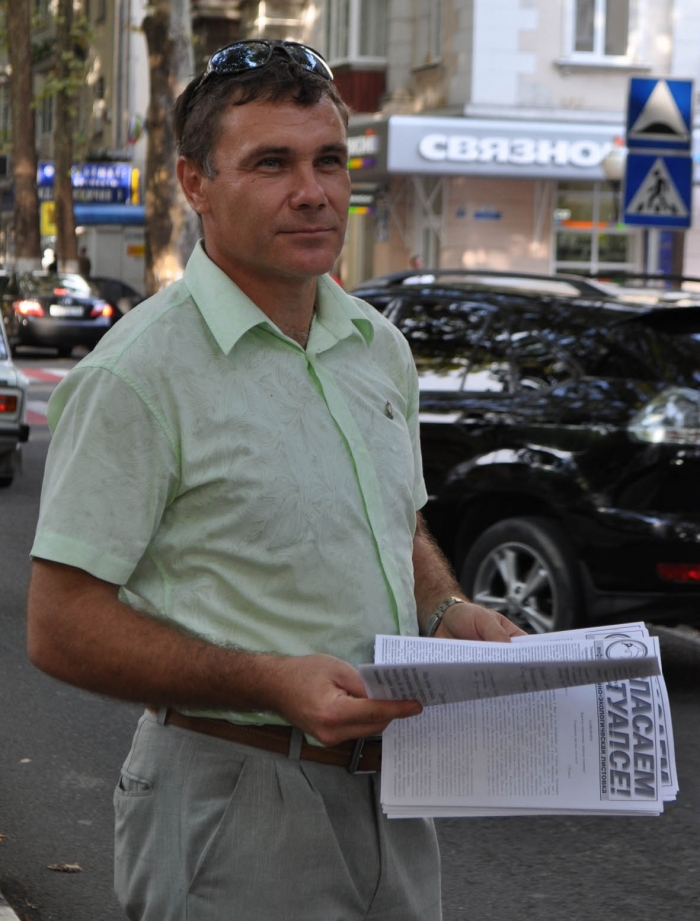Evgeny Vitishko

Evgeny Vitishko was born in Krasnodar region in 1973. After graduating from high school he finished university studies in the Ukhta industrial insititute in the Komi republic, specializing in geology.
In 1999 he moved to Tuapse in Krasnodar region and for several years worked in the spheres of tourism. In 2006-07 he worked for the city urban planning department. However after writing a critical article in a local paper about the downsides of a decision to switch the status of Tuapse from a city to a rural settlement, he was forced to quit his job, taking up the job of head geologist at a state company Tuapseberegozaschita (Tuapse erosion protection).
In 2009 he co-founded a private contracting firm “Black sea coastal and mountain protection management”. Since 2011 he works at the firm as head geologist.
Private life
Evgeny is married with two sons aged 7 and 14. His hobbies include hiking, biking, tennis, and Argentinian tango.
Civic activism
Since 2008 Evgeny is also the head of Tuapse’s scientist organization TuapsePublicUniversity, which organizes educational programs in the town. As part of his work in this group, Evgeny has been the organizer of conferences on volcanic activity, biosphere, and environment.
Since 2009 Evgeny became a member of the regional environmental group Environmental Watch on North Caucasus. In 2010 he was elected to be the member of the council of the organization, and continues to be annually reelected to this position to this day. As part of his work for EWNC, Evgeny oversees environmental campaigns in Tuapse, such as monitoring the proliferation of dangerous industries in the area opposed for their detrimental effect on the local tourism sector and the environment of the Black Sea.
Evgeny considers one of the biggest threats to environmental safety in Tuapse to be local Rosneft facilities, namely the oil giant’s oil refinery and terminal in the town. In 2005 Evgeny was one of the people involved in making a film for a popular Russian TV program Fitil about the accumulation of oil spills in Tuapse, forcing Rosneft to engage in cleanup efforts of the underground oil lens in the town.
Evgeny actively opposes the expansion of the oil refinery in Tuapse, located in immediate proximity of residential areas. He is also against the plans of Rosneft for oil production on the Black Sea shelf, and fights against dumping of hazardous waste and oil-polluted soil at the Tuapse city dump on the Kadosh cape.
Together with the police authorities, Evgeny has fought against theft of sand and river gravel from Tuapse area rivers : Tuapse river, Shepsi river, Tu river, and Kabak river. In 2013 he led the efforts to stop large-scale gravel extraction from the river Pshish.
Evgeny has opposed the construction in Tuapse of the Eurochem terminal for fertilizers, organizing rallies of thousands of people.
In 2012 Evgeny participated in volunteer efforts after deadly floods in Krymsk, helping victims of the flood and bringing over donations gathered in Tuapse. He also conducted a study of what caused the flood in nearby village of Novomikhailovsky in August 2012. Using his expertise he concluded that part of the reason why the flood reached its catastrophic levels was the artificial filling of an old riverbed of the river Nechepsukho, where a private hotel was erected.
Evgeny spent much of his energy on issues stemming from the preparations for the Sochi Winter Olympic Games.
In 2009 he participated as an expert in a report “On the Impact of the Olympic Games” prepared by the MoscowStateUniversity for the Sochi Organizing Committee.
In March 2011 and May 2013 he took part in environmental assessments of mishaps resulting from non-compliance with construction plans for the combined rail and auto Olympic road linking Adler and Krasnaya Polyana.
In the summer of 2011 he was asked by Russian police to participate as an expert and head geologist in drilling and lab works in a probe of using illegally extracted river gravel for constructing several roads in the new Sochi airport.
In August 2013 he also managed drilling works on the Formula One track works to calculate how much of the construction was done using illegally extracted gravel from the river Psou.
In 2012 he participated in the campaign protesting the construction of the Kudepsta power plant in the Sochi area and represented the view of Environmental Watch on North Caucasus at the public hearings of the project.
Among other work in Sochi, Evgeny helped the residents of the Lazarevsky district to challenge illegal gravel extraction in the Shakhe river, successfully stopping the mass illegal extraction. He also engaged in campaigns against illegal waste dumping in Sochi. In 2013, Evgeny was instrumental in opposing the government’s plans to lift protected status from a range of protected landmarks in Sochi which the community believes will lead to these landmarks’ commercial development and construction.
Together with other activists, Evgeny participated in several inspections of a massively destructive road to the VIP resort Lunnaya Polyana in the Sochi area.
Evgeny has repeatedly criticized the destructive nature of Olympic development in Sochi.
Political activities:
Evgeny was a member of the Yabloko party for about two years and ran for several public offices on the party’s ticket, including regional parliament and Tuapse mayor. The Tuapse city court ruled to cancel his mayoral candidacy in the summer of 2013, preventing him from participating in the polls.
Fence Case:
Evgeny was one of the activists who on November 13, 2011 participated in a public inspection of a Black Sea public forest near the village Dzhubga, the location of what is believed to be the dacha of Krasnodar governor Alexander Tkachev.
After several attempts to highlight to the authorities of an illegal fence in the area, the group of activists cut open one of the sections of the fence, erected on public land in violation of the Russian forest code. Some of the activists painted signs on the fence, including “Sanya is a thief!”, “The forest is public” and “Tkachyv, crook and thief, go away!” The public inspection uncovered logging of protected species of trees, namely the Pitsunda pine unique to the Black Sea coastal climate.
In December 2011, a criminal probe was launched against Evgeny Vitishko and Suren Gazaryan, another participant in the inspection. They were accused of property damage motivated by hooliganism and charged with the crime (Article 167, part 2 of the Russian criminal code). In May 2012 the trial began against the two activists, leading to a conviction despite a public uproar and clear absurdity of the accusations. Judge Galina Avdzhi sentenced both defendants to three years (suspended) with a trial period of two years.
Evgeny Vitishko’s guilt was never proven in court, and the only witness of the prosecution said he saw Evgeny standing while holding a drill, and not actually painting any signs on the fence.
As part of the terms of the suspended sentence, Evgeny could not change his place of residence or travel without the sanction of the local parole office of the prison service, and abide to a strict curfew of midnight to 6 am during the trial period of two years.
This strict curfew led to many complications for Evgeny, who leads a very active life and is involved in many projects. In December 2012 his travel restrictions were made even tighter, and he had to now notify the parole service of any movement beyond Tuapse as well as show up to the service twice a month for check-ins. He was under constant surveillance and his phones were tapped. The parole service made several warnings to Evgeny of alleged curfew violations. This pressure was the reason for a statement by Human Rights Watch in his support.
In November 2013 the prison service appealed to the Tuapse court to change his sentence from suspended to real based on his alleged violations. The hearings were pushed back repeatedly due to the decision of the deputy chairman of the Russian Supreme Court to side with an appeal of Evgeny’s co-defendant Suren Gazaryan, ruling that the “fence case” contained flaws and must be sent back to the Krasnodar regional court. However the regional court ruled in opposition to the Supreme Court that the initial verdict was fair.
Following this decision, the Tuapse court heard the appeal by the prison service to jail Evgeny Vitishko, and ruled to support their case and send Evgeny to a penal colony for “systematic violation of the curfew”.
24/12/2013






